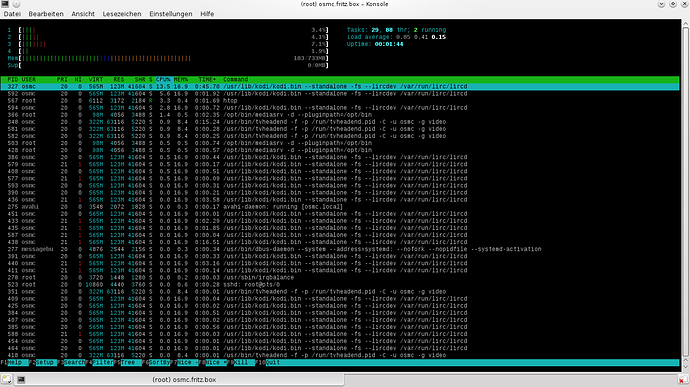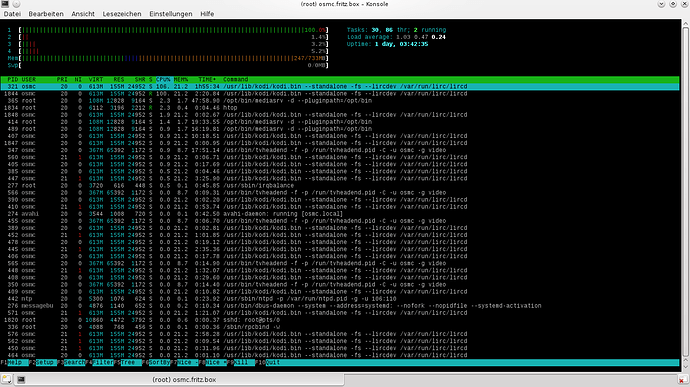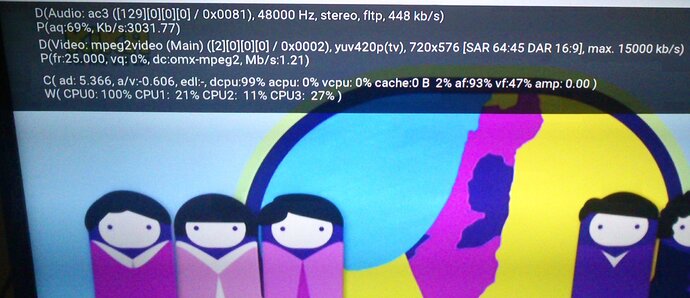Used to get this with raspbmc but at the time had a failing nas hdd which I put down to that.
Replaced hdd still had the same issue.
Installed osmc when that came out and was still the same.
It wouldn’t do it all the time. Sometimes could go an hour with no problem then sometimes every 5 mins.
Video would freeze for 5/10 secs but could hear audio then the video go really fast and catch up.
Since 15 rc I haven’t noticed it happen
Thought at the time if I disabled Dts passthrough it helped
On my raspi “stereo upmix” doesn’t help!
Before reboot:
- HD-Video from german ARD-TV (recording with tv-headend): OK
- SD-Video from german Kika-TV (recording with tv-headend): jerking
After reboot:
- Both OK
I will try and upload some files to somewhere. I’ve actually found that one series will stutter and glitch with it enabled, and another will stutter without it enabled. It’s odd, I’ve never had to touch this option before the update.
OK, one episode of Sabrina (the wife’s series I promise!!):
https://drive.google.com/file/d/0BzRcS55b-LBAY1A4aVF0VGhUNDg/view?usp=sharing
(Needs Stereo Upmix enabling)
One episode of breaking bad:
https://drive.google.com/file/d/0BzRcS55b-LBAV2FXdFdldUItams/view?usp=sharing
(Needs Stereo Upmix disabling)
See above post with my other settings. This is on a Raspberry Pi 2.
Audio is playing okay for me with your settings. Can you post a debug log when playing sabrina and getting the issue?
I assume you are using HDMI output? What is make and model of TV and receiver? Can you confirm if problem still occurs when directly connected to TV or when using analogue output (e.g. with headphones connected).
Hi, could you tell me how to get the debug log for you?
Yes, using HDMI out to Sony DH810 Receiver, which then outputs to Samsung ue40es6540 TV through HDMI. Happens with Amp on/off (when off, it passes picture sound through to TV).
I can attempt to connect it to TV by coax/headphones, if I can get the the back of it. It’s more the video that keeps stuttering for me, than the sound.
Similar problem but for me (on Pi1) it seems to relate to HD content only.
These occur frequently but not at set intervals from what I can count
Occasional to regular narrow horizontal black line (2-3 inches high) across screen sometimes moves up the screen
Occasional to regular full black screen
Occasional sound drop out
using ‘TWiT’ plugin and content from ‘Coding-101’
Allow hardware acceleration - OMxPlayer is ON
Allow hardware acceleration - MMAL is ON
decode_WVC1 is set in config.txt
decode_MPG2 is set in config.txt
htop show CPU load around 60% (Hyperion also running)
Debug onscreen info shows 5 to 7 FPS
Debug log on dropbox here
Hope this helps
Can you try adding config_hdmi_boost=7 to config.txt.
Can you try disabling “adjust display refresh rate to match video” (if enabled).
Can you try with hyperion disabled (and hardware unplugged - it could be a power supply issue).
Wow @popcornmix excellent advice!
added hdmi_boost
disabled “adjust display refresh rate to match video”
rebooted
stopped Hyperion (systemctl stop hyperion)
unable to disconnect leds as power supply is shared with Pi via soldered connections
Content now playing for 10 minutes without issue
(FPS more like 6 - 8 now and CPU running around 40%)
I’ll play around further to see if I can isolate which one fixed the problem.
I didn’t have to play too long…
I just turned on Hyperion and the problem immediately returned, though maybe not as bad.
Turned Hyperion off again and problem goes away, so it looks like interference between data line and power or just because the power is shared between leds and Pi ![]()
Do you have a voltmeter? Measuring the voltage on the Pi would be useful:
http://elinux.org/R-Pi_Troubleshooting#Troubleshooting_power_problems
The voltage across the wires supplying both the Pi and Leds is fluctuating slightly (digital meter) around 6v
(I’m using a variable power supply set to 5V output and capable of supplying 3.6amps @ 5v)
Also I’m backfeeding the power to the Pi through the GPIO pins and as per your link I am aware that this is not ideal, it has been set up that way for a year but I only recently installed OSMC on the Pi (always had XBMC running seperately on a HTPC)
I have to read through that power trouble shooting link in detail but I should probably look a feeding the Pi power in through the standard micro USB port.
6V? That is too much for the Pi.
Note: the 5V from the Pi is also fed to the TV through HDMI, so it may not like that either.
ooops now I’m worried, the HDMI from the Pi is plugged into a brand new 48 inch TV.
Can the Pi be powered by its own transformer through the micro USB with the lights powered by
a separate transformer - can/do the data leads between Pi and Leds still operate independent of both?
ps
Pi now being powered by original PiHut transformer and leds off for now ![]()
On this file the video is jerking:
logo.ts (removed)
kodi.old.log (removed)
kodi.log (removed)
Allow hardware acceleration - OMxPlayer: ON or OFF both with jerking
After Reboot there is no jerking on this file!? => strange
Michael
Very strange. See if you can work out what starts it jerking?
i.e. if you just start and stop it a number of times does it start to jerk?
Does playing some other file or using an add-on or external problem cause it?
Does it occur after being left overnight, or tv being powered off and on?
- TV off on: without any change
- left overnight: without any change
- it doesn’t make any different to start and stop again an again
htop after reboot (at playing the SD-Video):
and before reboot (at playing the SD-Video):
Without playing the Video the CPU usage is very low also by playing an HD-Video!
Missing hardware acceleration?
How can I prove it?
You can check if video is hw accelerated with codec info overlay (‘o’ key)
omx-mpeg2 would be omxplayer acceleration
mmal-mpeg2 would be mmal acceleration
ff-mpeg2 would be no acceleration (ffmpeg software decode).
Thanks for the advice.
Ok, the omxplayer acceleration is in use:
What can I do for solving this mystery?
“strace -p”?
Only 2% buffer isn’t going to help


